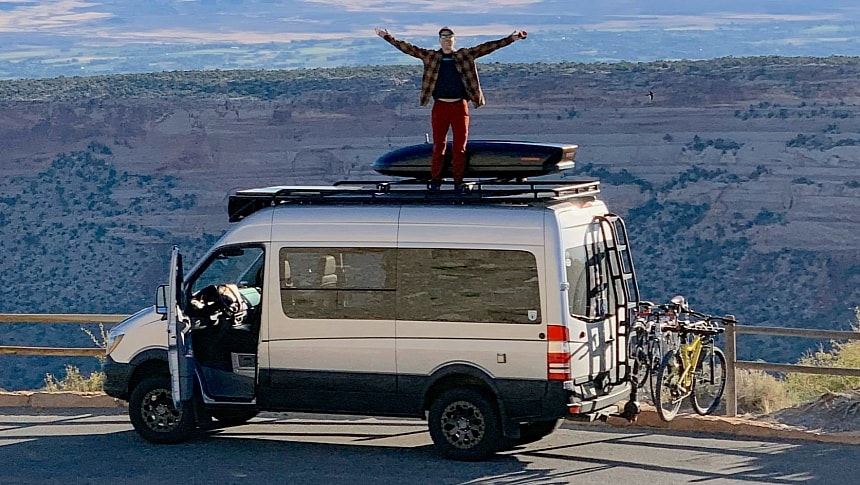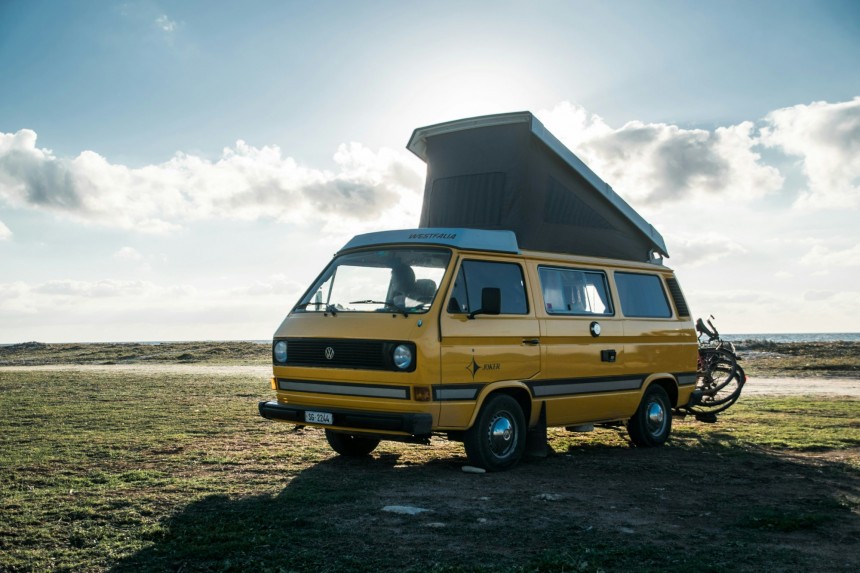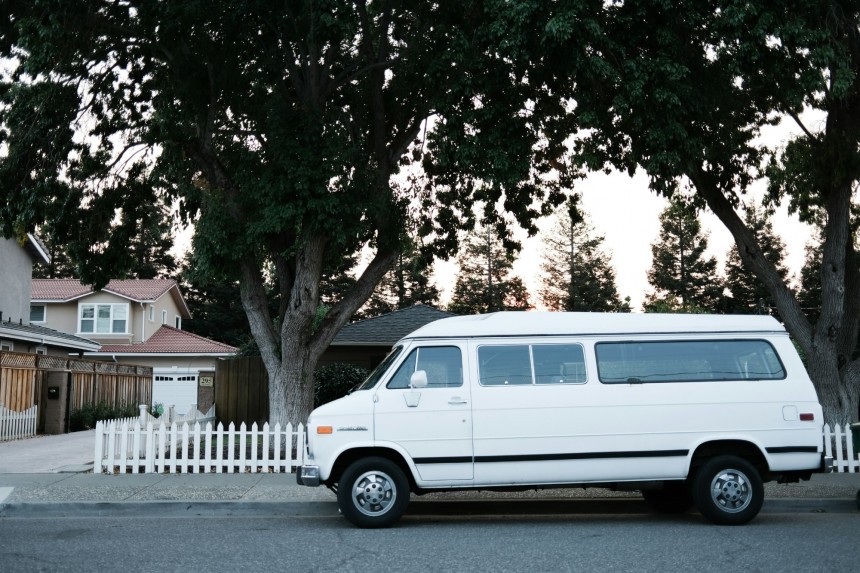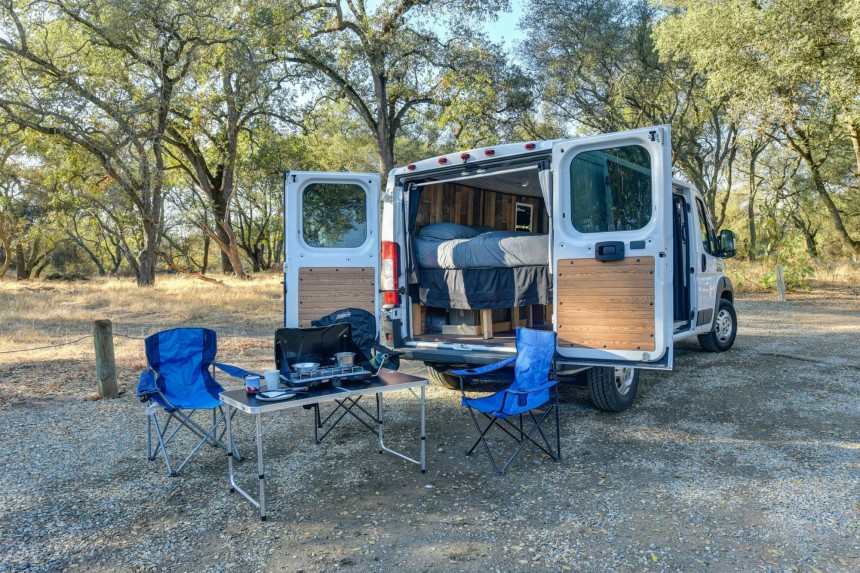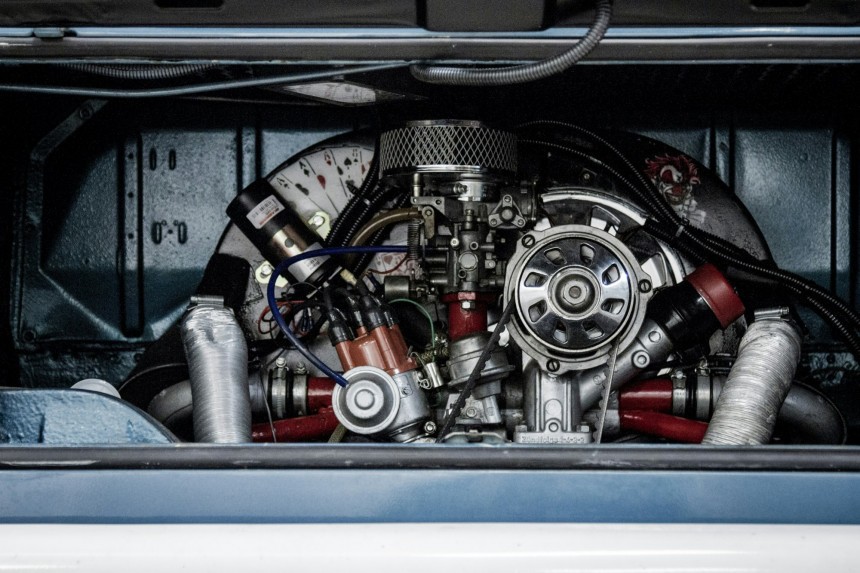You're thinking of getting your hands on a camper van. One solution is purchasing a used one. Today's article is meant to provide tips and tricks to guide you through the experience to ensure you make the best decision.
Buying a camper van, regardless of whether it's used or new, is a significant investment. It can be an exciting yet overwhelming experience, but I'm here to make sure you check all the boxes before taking the leap. This way, you'll be ready to confidently hit the open road into your tiny home on wheels.
This article is a continuation of a series I wrote about camper vans. First, I talked about camper van types and sizes to help you determine the exact model that best suits your wants and needs. My latest article discussed the ten things to consider before buying a camper van.
So, are you sure you want to purchase a used camper van? Before we go any further, let me quickly mentiont some pros and cons of buying used.
Pros:
Cons:
If you're all clear regarding what type of van you want and have answered most of all the questions I listed in the previous article, you've already done half the job. However, it's equally important to make sure the unit you plan to buy is in good condition.
Before you start talking to any seller, you should have a budget set up. If you don't have the money to pay upfront, you must understand the financing options and figure out how much you're comfortable with paying. Dealerships often offer various financing plans, which will vary depending on your credit score, down payment amount, and the length of the loan term, as well as other factors.
If you find to buy from a private seller, there's a chance they might accept payment over time. Don't assume that a private seller won't accept – yes, there's a lower chance, but it's best to ask instead of assume.
There are pros and cons when choosing between dealerships and private sellers. Let's go through some of them.
You'll find countless camper van dealers, most offering good vehicles at fair prices. However, like in most industries, some are more interested in making a profit and less in making the customer happy.
First, I suggest checking the website to get a feel for what sort of stock the dealer has and if it matches what you're searching for. Ideally, the company should be accredited by national trader associations. Moreover, leaving the internet aside, another excellent way to find a reputable dealer is by asking family, friends, and colleagues whom they recommend.
Suppose you found a camper van you're interested in. Before going to check it out physically, do a vehicle history check by searching for the VIN. Of course, dealers do this themselves, but it never hurts to do your own checking as well.
You can also check the van's mechanical history before visiting. For instance, in the UK, you can check the MoT (Ministry of Transport) history to get an idea of what work has been carried out and if the mileage corresponds to what is advertised. However, some countries, like the United States, don't have a scheduled system for vehicle testing.
Is the camper van as described by the dealer? A good dealership won't hesitate to give you a full run-down of all the details regarding the van's condition, including its age, mileage, servicing, and more.
Check that the dealership offers the complete van documentation before you sign anything. And don't make decisions based on promises, like the dealership saying they will (at some point) send you the service history or any other information. Make sure you've checked out everything there is to check out before signing a deal.
Many of the things I mentioned above also apply to buying from a private seller. However, it's much riskier, but you also have the chance of getting a much better deal. You'll need a bit of luck, but there are many things you can do to make sure you increase your chances of getting a fantastic deal.
It's completely normal to feel excited when preparing to buy a camper van – however, don't let this excitement take over and make you take a bad deal. For instance, if the prices look too good to be true, it probably is. You might see some crazy good deals that require deposits – there's a chance those deals come from scammers who will take your deposit and disappear.
You often get no buyer's protection if you want to buy a camper van from a third-party marketplace. Of course, these platforms do their best to remove scams and ill-intended people, but they cannot guarantee the quality of what you're buying.
As I said earlier, research is vital – when dealing with an online advert from a private seller, make sure the van you're viewing is offered for the right price considering its make, model, condition, and age.
Like with dealerships, check the vehicle identification number and the service history, if applicable. You don't want to end up buying a stolen or written-off vehicle.
A promising sign is that you view the van at the seller's house, and the address matches the one on the vehicle's registration document. Often, an honest seller will meet you at their home rather than a car park.
This tip may seem obvious, but check out the vehicle in daylight rather than at night. Even if you're very familiar with vans or cars in general, it doesn't hurt to have a second pair of eyes. What's more, you can also take the vehicle to a mechanic and pay them to check for any issues.
Camper vans aren't designed to sit unused for months on end. Those that do are prone to all kinds of age-related chassis, suspension, and mechanical problems.
Don't be fooled by a low number of miles/kilometers - a three-year-old camper van with 100,000 miles is a much better deal than a six-year-old one with 50,000 miles.
Regarding the exterior, start by looking for any visible damage or rust spots on the van's body. Then, inspect all windows and doors to ensure they open and close correctly.
Camper vans have been extensively modified to accommodate things like pop-top roofs, extra windows, ventilation, and more. That means more points where water can leak inside – so check for any signs of water leakage around the windows and doors and the seals around any other modifications.
Make sure all the exterior lights work as intended. What's more, don't be afraid to peek under the vehicle to check for rust or damage and whether there are any leaks from the engine or transmission fluids.
Next, you should look inside – check all the appliances and furniture to make sure they function as expected. Naturally, there will be some degree of wear and tear, but things should still work. As funny as it may sound, a good tip is to poke around all the nooks and crannies inside the camper – take out drawers, look behind furniture, and check every accessible corner. What's more, give the rig's walls and roof a solid push to see how much they flex.
The seller should be fine with this if they aren't hiding something. Furthermore, a flashlight would be good to have.
Another important box to tick is for the electrical components, such as lighting fixtures, outlets, fans, etc. Furthermore, open all closets and cabinets and inspect for any signs of mold or mildew, which can indicate water damage. Mold can also grow if the closets and cabinets are warmer than the rest of the vehicle. However, you're probably dealing with severe water damage if there are any visible brown spots.
The last critical part of the check is for everything under the hood. There are multiple things to inspect; here are some of them:
One thing I advise is using all your senses to check the vehicle, and this applies to all parts of the rig. Don't just rely on your eyes – for instance, let your nose be your guide. If the camper van smells musky, you might be dealing with mold. Moreover, when checking the oil, a burnt scent likely indicates an overheated engine, even if the oil looks clean.
Make sure to check the wear of the tires, and don't forget about the spare one. Be wary of uneven wear – it may be due to incorrect alignment or because of bent suspension components from potholes.
Regardless if you're dealing with a dealership or a private seller, the more relevant questions you ask, the better. Don't hesitate to get every worry off your mind, even if that means spending more time asking away.
Checking can only go so far. You should take your prospective camper van for a test drive and see how it performs. As with any test drive, take some time to do it – let the engine get hot, stop it when it is, then start it again. Also, check the smoke color when you start the engine.
Listen for any ringing, rattling, or abnormal sounds, not only from the engine but also from the suspension. Moreover, watch out for any slip from the clutch when dealing with manual transmissions or jerkiness in shifting with automatics. When you move the vehicle, check to see if any fluid stains are left on the ground.
Utility systems, such as those for gas and water, are essential in camper vans. It's critical you check they work properly. Make sure the pipework is in good condition and the propane canister is housed securely. If you're in doubt, have a specialist check them.
Most camper vans have water tanks – one for freshwater and one for greywater or waste. Check the tanks for leaks and pipe fitments. Of course, you should also see the water system in operation if possible.
And lastly, make sure the electrical system works. A good idea would be to check the waiting and how everything is arranged – again, having a recognized specialist electrician check the system before buying the camper van is worth it. In the best case, poor wiring means the electrical system will not work. However, in the worst case, it can lead to a fire.
If you've checked out other similar vans, you should have a good idea of what they go for. When you agree on a sum, you can pay a small deposit or the total amount but get a receipt from the seller if they operate commercially.
All in all, the key is to make a well-informed decision and stick to it. When it's all said and done, you'll be glad you took all this time to ensure you got the best deal. After that, it's time to enjoy your new camper van – go out there and make some fantastic memories.
This article is a continuation of a series I wrote about camper vans. First, I talked about camper van types and sizes to help you determine the exact model that best suits your wants and needs. My latest article discussed the ten things to consider before buying a camper van.
So, are you sure you want to purchase a used camper van? Before we go any further, let me quickly mentiont some pros and cons of buying used.
Pros:
- Lower initial cost
- Less depreciation compared to new models
- Cheaper insurance
Cons:
- Might not come with a warranty
- Possible hidden issues
- High maintenance costs
If you're all clear regarding what type of van you want and have answered most of all the questions I listed in the previous article, you've already done half the job. However, it's equally important to make sure the unit you plan to buy is in good condition.
Step 1: Find the right seller or dealer
Whether you like it or not, research is critical when buying camper vans. As a general rule, the more research you do, the better your chances of getting the best deal. Of course, that doesn't mean you have to go overboard and get stuck on research for a really long time without starting to take action.Before you start talking to any seller, you should have a budget set up. If you don't have the money to pay upfront, you must understand the financing options and figure out how much you're comfortable with paying. Dealerships often offer various financing plans, which will vary depending on your credit score, down payment amount, and the length of the loan term, as well as other factors.
If you find to buy from a private seller, there's a chance they might accept payment over time. Don't assume that a private seller won't accept – yes, there's a lower chance, but it's best to ask instead of assume.
There are pros and cons when choosing between dealerships and private sellers. Let's go through some of them.
You'll find countless camper van dealers, most offering good vehicles at fair prices. However, like in most industries, some are more interested in making a profit and less in making the customer happy.
First, I suggest checking the website to get a feel for what sort of stock the dealer has and if it matches what you're searching for. Ideally, the company should be accredited by national trader associations. Moreover, leaving the internet aside, another excellent way to find a reputable dealer is by asking family, friends, and colleagues whom they recommend.
Suppose you found a camper van you're interested in. Before going to check it out physically, do a vehicle history check by searching for the VIN. Of course, dealers do this themselves, but it never hurts to do your own checking as well.
Is the camper van as described by the dealer? A good dealership won't hesitate to give you a full run-down of all the details regarding the van's condition, including its age, mileage, servicing, and more.
Check that the dealership offers the complete van documentation before you sign anything. And don't make decisions based on promises, like the dealership saying they will (at some point) send you the service history or any other information. Make sure you've checked out everything there is to check out before signing a deal.
Many of the things I mentioned above also apply to buying from a private seller. However, it's much riskier, but you also have the chance of getting a much better deal. You'll need a bit of luck, but there are many things you can do to make sure you increase your chances of getting a fantastic deal.
It's completely normal to feel excited when preparing to buy a camper van – however, don't let this excitement take over and make you take a bad deal. For instance, if the prices look too good to be true, it probably is. You might see some crazy good deals that require deposits – there's a chance those deals come from scammers who will take your deposit and disappear.
You often get no buyer's protection if you want to buy a camper van from a third-party marketplace. Of course, these platforms do their best to remove scams and ill-intended people, but they cannot guarantee the quality of what you're buying.
As I said earlier, research is vital – when dealing with an online advert from a private seller, make sure the van you're viewing is offered for the right price considering its make, model, condition, and age.
A promising sign is that you view the van at the seller's house, and the address matches the one on the vehicle's registration document. Often, an honest seller will meet you at their home rather than a car park.
This tip may seem obvious, but check out the vehicle in daylight rather than at night. Even if you're very familiar with vans or cars in general, it doesn't hurt to have a second pair of eyes. What's more, you can also take the vehicle to a mechanic and pay them to check for any issues.
Step 2: Inspect everything
Before purchase, ensure you have thoroughly inspected the vehicle's exterior, interior, and mechanical components. However, first of all, you have to ask two crucial questions: is the camper van used regularly? If not, how long has it been sitting for?Camper vans aren't designed to sit unused for months on end. Those that do are prone to all kinds of age-related chassis, suspension, and mechanical problems.
Don't be fooled by a low number of miles/kilometers - a three-year-old camper van with 100,000 miles is a much better deal than a six-year-old one with 50,000 miles.
Regarding the exterior, start by looking for any visible damage or rust spots on the van's body. Then, inspect all windows and doors to ensure they open and close correctly.
Camper vans have been extensively modified to accommodate things like pop-top roofs, extra windows, ventilation, and more. That means more points where water can leak inside – so check for any signs of water leakage around the windows and doors and the seals around any other modifications.
Next, you should look inside – check all the appliances and furniture to make sure they function as expected. Naturally, there will be some degree of wear and tear, but things should still work. As funny as it may sound, a good tip is to poke around all the nooks and crannies inside the camper – take out drawers, look behind furniture, and check every accessible corner. What's more, give the rig's walls and roof a solid push to see how much they flex.
The seller should be fine with this if they aren't hiding something. Furthermore, a flashlight would be good to have.
Another important box to tick is for the electrical components, such as lighting fixtures, outlets, fans, etc. Furthermore, open all closets and cabinets and inspect for any signs of mold or mildew, which can indicate water damage. Mold can also grow if the closets and cabinets are warmer than the rest of the vehicle. However, you're probably dealing with severe water damage if there are any visible brown spots.
The last critical part of the check is for everything under the hood. There are multiple things to inspect; here are some of them:
- Fluid levels: oil, coolant, power steering, and brake fluid
- Timing Belt
- Hoses
- Brake pads and rotors
- Engine performance (start-up, idling, performance)
- Transmission performance
One thing I advise is using all your senses to check the vehicle, and this applies to all parts of the rig. Don't just rely on your eyes – for instance, let your nose be your guide. If the camper van smells musky, you might be dealing with mold. Moreover, when checking the oil, a burnt scent likely indicates an overheated engine, even if the oil looks clean.
Make sure to check the wear of the tires, and don't forget about the spare one. Be wary of uneven wear – it may be due to incorrect alignment or because of bent suspension components from potholes.
Regardless if you're dealing with a dealership or a private seller, the more relevant questions you ask, the better. Don't hesitate to get every worry off your mind, even if that means spending more time asking away.
Checking can only go so far. You should take your prospective camper van for a test drive and see how it performs. As with any test drive, take some time to do it – let the engine get hot, stop it when it is, then start it again. Also, check the smoke color when you start the engine.
Utility systems, such as those for gas and water, are essential in camper vans. It's critical you check they work properly. Make sure the pipework is in good condition and the propane canister is housed securely. If you're in doubt, have a specialist check them.
Most camper vans have water tanks – one for freshwater and one for greywater or waste. Check the tanks for leaks and pipe fitments. Of course, you should also see the water system in operation if possible.
And lastly, make sure the electrical system works. A good idea would be to check the waiting and how everything is arranged – again, having a recognized specialist electrician check the system before buying the camper van is worth it. In the best case, poor wiring means the electrical system will not work. However, in the worst case, it can lead to a fire.
Step 3: Negotiate!
If everything works out, it's time to make an offer. I cannot stress this enough – don't be afraid to offer less than the seller asks, as sellers almost always factor in some room for negotiation.If you've checked out other similar vans, you should have a good idea of what they go for. When you agree on a sum, you can pay a small deposit or the total amount but get a receipt from the seller if they operate commercially.
All in all, the key is to make a well-informed decision and stick to it. When it's all said and done, you'll be glad you took all this time to ensure you got the best deal. After that, it's time to enjoy your new camper van – go out there and make some fantastic memories.
